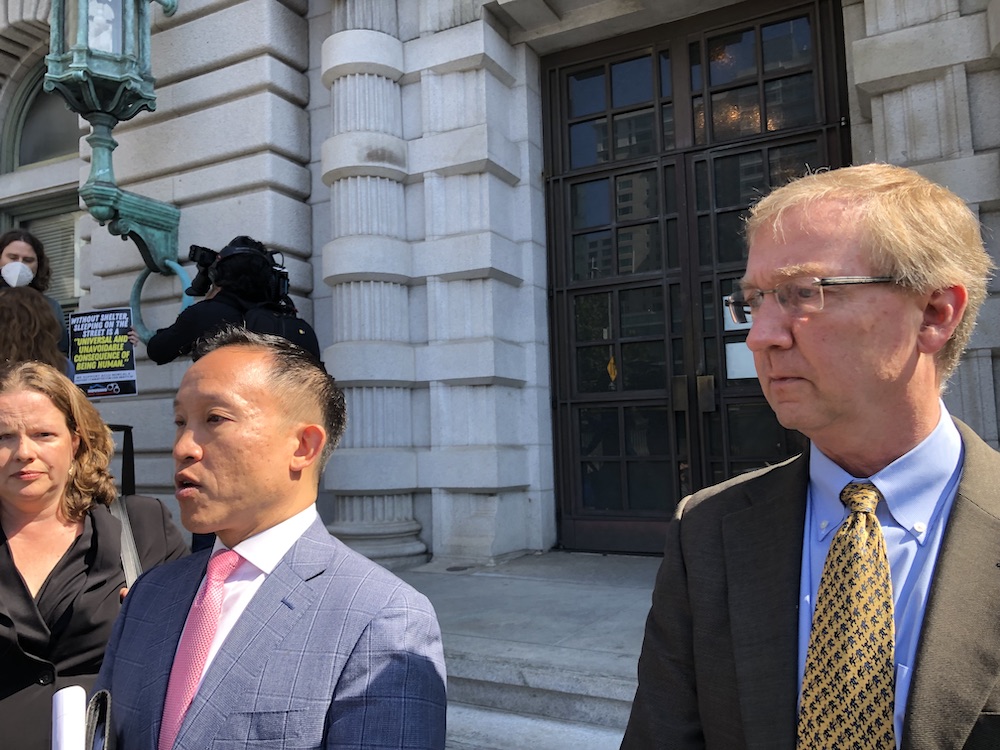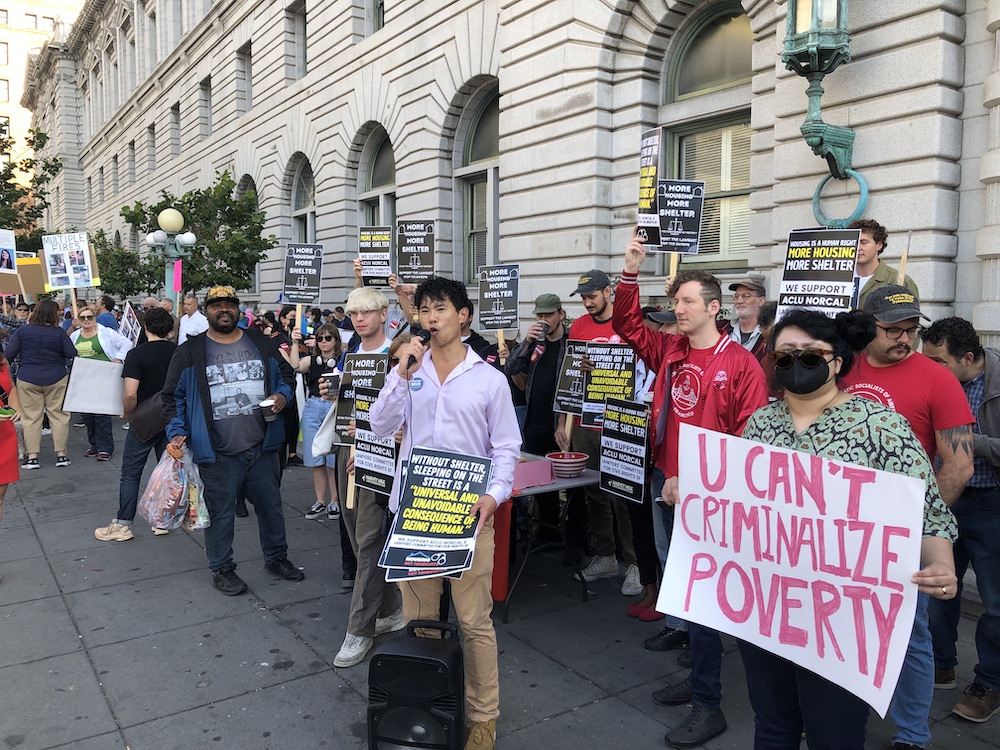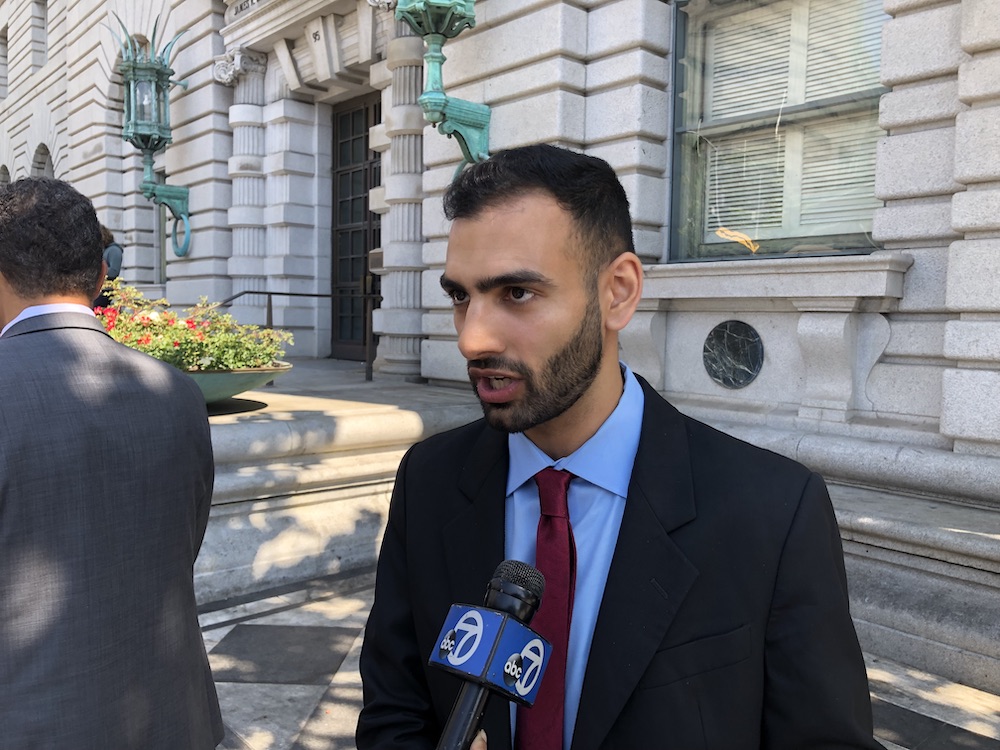The City Attorney’s Office revealed today the city’s new strategy for criminalizing homeless people, and it includes defining anyone who refuses a city shelter bed, for any reason, to be “voluntarily homeless” and thus subject to citations, fines, and potentially arrest if they remain on the streets.
In a remarkable admission, Deputy City Attorney Wayne Snodgrass, appearing in court on behalf the City Attorney David Chiu, insisted that for “20 of the 24 hours in the day” no city laws ban people from sitting, lying, or sleeping in public space, including parks—as long as they don’t have a tent or any form of shelter.
That is: If it’s pouring rain or very cold, the unhoused are welcome to sleep in public space and get wet and most likely sick, and they can’t keep more possessions than they can carry. So what’s the problem?

City Attorney David Chiu and his deputy, Wayne Snodgrass, presented the city’s case to allow sweeps of homeless camps.
All of this came up in the course of an hour-long oral argument before the Ninth Circuit Court of Appeals. Chiu, with the support of Mayor London Breed, has asked the court to vacate an injunction banning the city from conducting homeless sweeps, seizing people’s property, and citing them when there’s not enough shelter beds for even a fraction of the unhoused in the city.
It was hard to tell how the three judges—Lucy Koh and Roopali Desai, who are Biden appointees, and Patrick Bumatay, who is a Trump appointee, were leaning. They were asking both sides sharp questions.
They took the case under submission, and we don’t know when they will issue a ruling.
Meanwhile, the Coalition on Homelessness will be back in federal court tomorrow to ask Magistrate Judge Donna Ryu to appoint a special master to oversee enforcement of the injunction, since the city continues to violate it on a regular basis.
Help us save local journalism!
Every tax-deductible donation helps us grow to cover the issues that mean the most to our community. Become a 48 Hills Hero and support the only daily progressive news source in the Bay Area.
Snodgrass opened the argument talking about how much money the city already spends on homelessness. Then he said the city needs to be able to “use every tool” to encourage people to get off the streets and into shelter, and the threat of sweeps and criminal citations is part of that mix.
He said that some unhoused people refuse shelter, and that the injunction isn’t clear on whether that makes them “voluntary” or “involuntary” homeless people.

Jeffrey Kwong, president of the Milk Club, leads a rally in support of the Coalition on Homelessness.
Bumatay, along with the other judges, was very clear: The Ninth Circuit has never said that people who refuse shelter are still protected under the Martin v. Boise decision, which is at the heart of the injunction. “We said, if you have access to shelter and housing, you are not homeless,” Bumatay noted.
The question, which is pretty weird, was at the heart of the arguments. For the record: The city’s shelters are at best problematic. Many people feel unsafe there. The shelters are congregate settings at a time when Covid is again on the rise. They have very strict rules. You can’t use alcohol or drugs, which means people with substance abuse issues are forced into withdrawal without medical treatment. If you have a partner or a pet, you can’t bring them with you.
So the shelters are not a real solution to homelessness.
“If the offer requires someone to separate from family and give up pets or belongings, is that an adequate offer?” Koh asked.
Snodgrass: “Shelters are not required to accept pets.”
More: Snodgrass said that San Francisco is not like Boise, which had a strict anti-camping ordinance. “In San Francisco, people are allowed to sleep on the streets or in parks for 20 of the 24 hours in a day,” he said. “The city only does enforcement if there is a tent or structure.”
I asked Chiu and Snodgrass after the hearing whether that meant people are free to sleep outside in the rain, but not allowed to protect themselves or their possessions for the elements. “That is what the law says,” Snodgrass told me.
Joe Lee, from the firm of Latham and Watkins, which is helping the ACLU and the Lawyers Committee for Civil Rights litigate the case, told the judges that as long as there are more unsheltered people than there are shelter spaces, it’s unconstitutional to criminalize sleeping on the streets.
The very extensive record in the original suit shows that the city is routinely sweeping homeless camps in violation of federal law, and that city workers admit they have taken people’s possessions and issued citations without offering shelter, he said.
In fact, he argued, at times the city will offer shelter to people who are camping on the streets, but at the same time kick out others who are in the shelters, to justify the sweeps.
“The factual record is undisputed,” he said. “There are people who are involuntarily homeless because they have no place to go. These laws are used to criminalize homelessness. … The city doesn’t dispute that it’s engaging in unconstitutional conduct.”
Under questioning, Lee said that if a person is offered adequate and acceptable shelter and refuses it, that person is no longer “involuntarily” homeless.
Chiu seized on this as some sort of profound deal. From his press office:
We were pleasantly surprised to receive this major concession from Plaintiffs during oral argument today,” said City Attorney Chiu. “It never made sense that a person who rejected a shelter offer or had a shelter bed but chose to maintain tents on the street should be considered ‘involuntarily homeless.’ We are pleased Plaintiffs agree that enforcement action can be taken against individuals who refuse shelter. I appreciate the thoughtful questions and discussion from the judges today, and look forward to their decision.”
In December 2022, Judge Donna Ryu issued a preliminary injunction that prohibits San Francisco from enforcing or threatening to enforce certain laws prohibiting public lodging or camping against “involuntarily homeless individuals” as long as the number of people experiencing homelessness exceeds the number of available shelter beds.
However, the order did not define “involuntarily homeless,” and Plaintiffs had previously argued that any person experiencing homelessness should be considered involuntarily homeless even if they refused an offer of shelter. This created uncertainty about whether the City could enforce laws against those who refuse shelter or have shelter beds but choose to maintain tents on the street. This is especially problematic as a significant number of unhoused individuals approached by City workers have rejected offers of shelter, particularly after the injunction was issued.
But I spoke with Zal Shroff, acting director of the Lawyer’s Committee, after Chiu’s press availability, and he told me that nothing in the plaintiff’s position had actually changed. The problem is that there’s not adequate shelter for even a fraction of the unhoused—and nothing in any discussion or oral arguments changes that.

Zal Shroff, with the Lawyers Committee on Civil Rights, said the plaintiffs position hasn’t changed.
Still, Chiu’s position sends a clear signal of where Breed Administration is heading. The administration wants the ability to claim that unhoused people were given an offer of shelter, that they refused it (even if that offer was bogus)—and that the city now has the right to conduct sweeps.
Outside the courtroom, two groups held competing demonstrations, one organized by the Harvey Milk Club, the other featuring Mayor London Breed and Sups. Matt Dorsey, Rafael Mandelman, and Joel Engardio.
Dorsey, like some of the people holding signs, directly attacked the Coalition on Homelessness, saying the group had “marginalized itself” by suing. Other signs attacked, in some cases in very disturbing and even violent language and images, both the coalition and its director, Jennifer Friedenbach.
Some of the people who were lined on the side of Breed, Dorsey, Mandelman and Engardio went further.
“There were white guys who were telling women of color to go back where they came from, really getting in people’s faces,” one person who at the event while I was in the courtroom, and, who for good reason didn’t want to be named, told me. “It was a little scary, and felt almost like a MAGA rally.”
This is what City Hall demonizing homeless people has come to in San Francisco, 2023.




